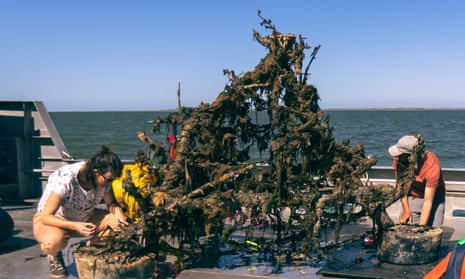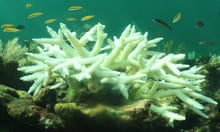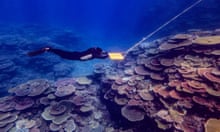Reefs made from sunken trees can help restore biodiversity in degraded marine habitats, scientists have found.
It is estimated that coral reefs support about 25% of all marine life. They provide housing, food and areas to spawn for millions of marine species and are the backbone of maintaining the aquatic life cycle.
Since the 1950s, more than half of natural coral reefs have been lost to climate change, which has had dire effects on marine biodiversity. Experts estimate that if nothing is done to reduce biodiversity loss, more than a million species globally will be at risk of going extinct.
To combat this, scientists have been developing methods to revive aquatic communities. The latest method involved sinking artificial reefs made from pear trees in the Wadden Sea in the Netherlands.
A team of researchers built dozens of pyramid-shaped structures made out of felled pear trees, sank them to the seabed and monitored them for more than six months.
Jon Dickson, a PhD candidate at the Royal Netherlands Institute for Sea Research and lead author of the study published in the journal Frontiers in Marine Science, said: “We have fossil records of sunken wood communities dating back to the Jurassic period … we are trying to simulate what it used to be like. [Because] trees are cheap and waste products, it’s cheaper to scale than using concrete or sunken ships.”
Dickson and colleagues found that after six months the tree reefs were home to algae and more than 15 sessile organisms – species that are immobile and typically anchored to a surface, like barnacles on the hull of a ship.
They also found that the sites with tree reefs were home to three times more species of fish than control areas without.
These findings suggest that certain marine habitats could be recovered through the use of these tree reefs.
“Hopefully we can push the knowledge that we’ve learned into other similar systems, [such as] in the North Sea … and help the fish population recover there,” Dickson said.
In 2017, researchers in Germany published similar findings after studying deep sea organisms that inhabited sunken tree logs. They found that different species were attracted to the sunken wood depending on the location.
Dickson said: “I’d love to do [this experiment] somewhere with clearer water where we can actually visually observe how these reefs are providing habitat for fish and other organisms, as well as elsewhere in the Netherlands and North Sea.
after newsletter promotion
“The flora and fauna vary even 200km down the coast, so I’d be fascinated to learn. You also have different [types of] trees in different places. So is that affecting what’s going on there?”
Since the initial results were recorded last year, Dickson and colleagues have continued to monitor the tree reefs in the Wadden Sea and seen changes to their inhabitants, including the addition of fish eggs.
“I’m really hopeful that we can kickstart the formation of natural reefs again by creating biodegradable reefs. [In] the southern North Sea there used to be 30% oyster reefs, now it’s less than 1%,” he said.
“I feel like we’re at the point in this global biodiversity crisis where we need to accept that we don’t know all the answers and just start doing it on a wide scale [because] some action is better than no action.”








